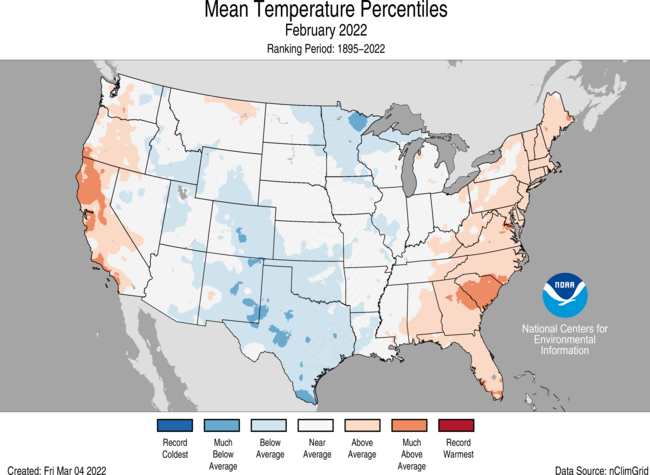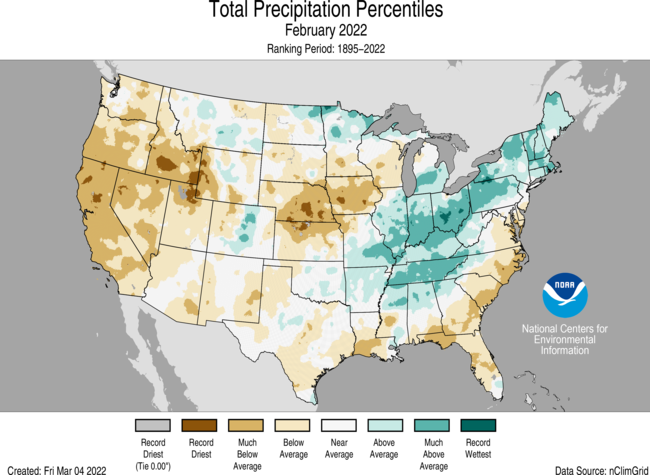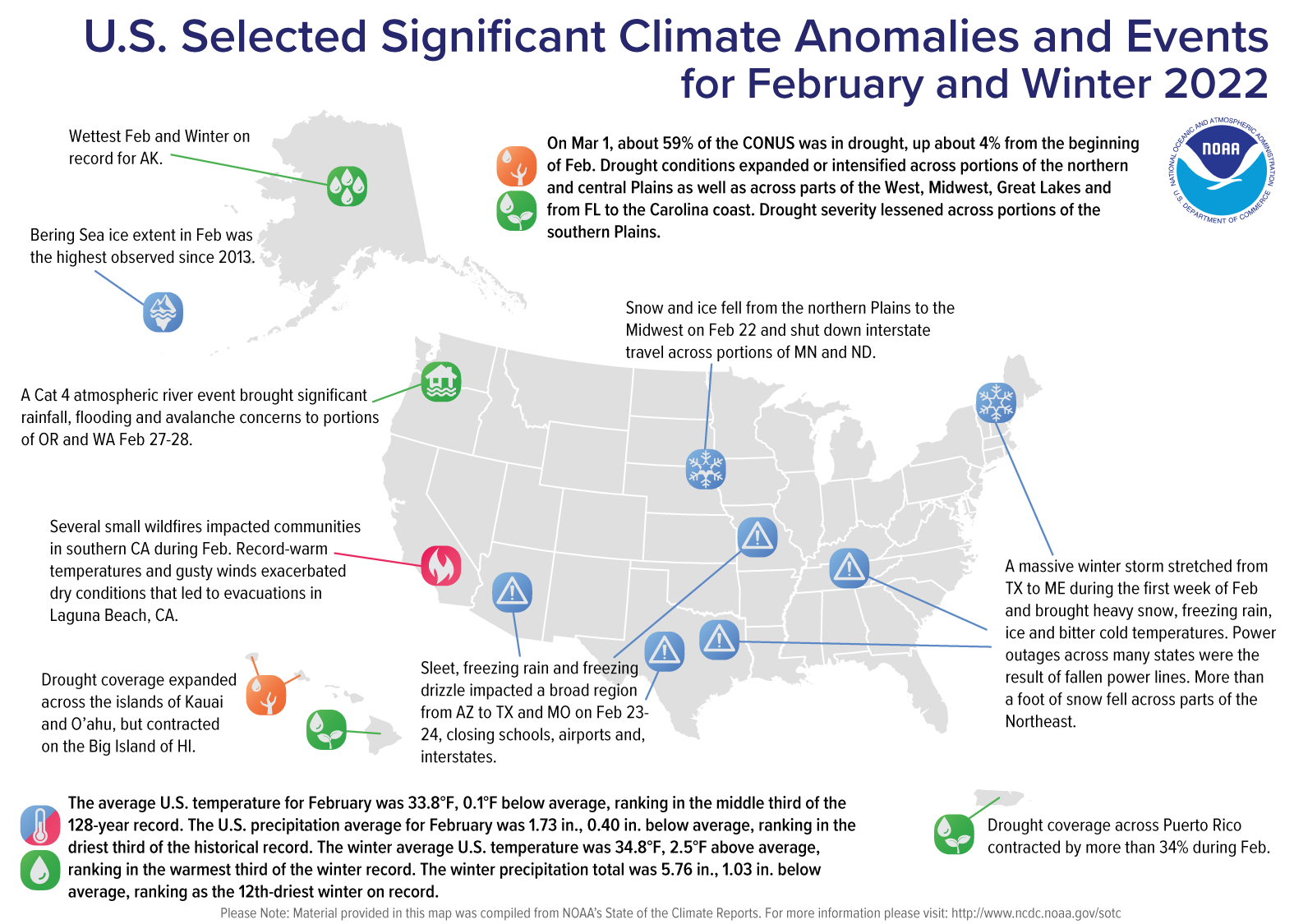February Capped off a Warm, Dry Winter
Special Stories
10 Mar 2022 2:00 AM
[Blizzard conditions observed in Grand Forks, ND on the morning of February 11th. Image from the NWS Grand Forks]
February continued 2022’s relatively dry start, with the majority of the contiguous U.S. in drought. Here are more highlights from NOAA’s latest monthly U.S. climate report:
 The average temperature across the contiguous U.S. last month was 33.8 degrees F, 0.1 of a degree F below the 20th-century average, ranking in the middle third of the climate record.
Below-average temperatures were felt across portions of the northern Plains, Great Lakes and from the central Rockies to the Gulf Coast. Temperatures were above average across portions of the West Coast as well as from the Southeastern U.S. to New England.
February’s average precipitation was 1.73 inches (0.40 of an inch below average), which ranked in the driest third of the historical climate record.
Above-average precipitation fell from the Mid-Mississippi Valley to New England, with Ohio seeing its sixth-wettest February on record. Precipitation was below average across most of the West and portions of the Plains, Southeast and Mid-Atlantic. California and Nebraska had their second-driest Februarys on record, while Nevada had its third driest.
The average temperature across the contiguous U.S. last month was 33.8 degrees F, 0.1 of a degree F below the 20th-century average, ranking in the middle third of the climate record.
Below-average temperatures were felt across portions of the northern Plains, Great Lakes and from the central Rockies to the Gulf Coast. Temperatures were above average across portions of the West Coast as well as from the Southeastern U.S. to New England.
February’s average precipitation was 1.73 inches (0.40 of an inch below average), which ranked in the driest third of the historical climate record.
Above-average precipitation fell from the Mid-Mississippi Valley to New England, with Ohio seeing its sixth-wettest February on record. Precipitation was below average across most of the West and portions of the Plains, Southeast and Mid-Atlantic. California and Nebraska had their second-driest Februarys on record, while Nevada had its third driest.


Climate by the numbers
 The average temperature across the contiguous U.S. last month was 33.8 degrees F, 0.1 of a degree F below the 20th-century average, ranking in the middle third of the climate record.
Below-average temperatures were felt across portions of the northern Plains, Great Lakes and from the central Rockies to the Gulf Coast. Temperatures were above average across portions of the West Coast as well as from the Southeastern U.S. to New England.
February’s average precipitation was 1.73 inches (0.40 of an inch below average), which ranked in the driest third of the historical climate record.
Above-average precipitation fell from the Mid-Mississippi Valley to New England, with Ohio seeing its sixth-wettest February on record. Precipitation was below average across most of the West and portions of the Plains, Southeast and Mid-Atlantic. California and Nebraska had their second-driest Februarys on record, while Nevada had its third driest.
The average temperature across the contiguous U.S. last month was 33.8 degrees F, 0.1 of a degree F below the 20th-century average, ranking in the middle third of the climate record.
Below-average temperatures were felt across portions of the northern Plains, Great Lakes and from the central Rockies to the Gulf Coast. Temperatures were above average across portions of the West Coast as well as from the Southeastern U.S. to New England.
February’s average precipitation was 1.73 inches (0.40 of an inch below average), which ranked in the driest third of the historical climate record.
Above-average precipitation fell from the Mid-Mississippi Valley to New England, with Ohio seeing its sixth-wettest February on record. Precipitation was below average across most of the West and portions of the Plains, Southeast and Mid-Atlantic. California and Nebraska had their second-driest Februarys on record, while Nevada had its third driest.

Other notable climate events
Drought tightened its grip: By the end of February, 59.2% of the contiguous U.S. was in drought, up nearly 4% from the beginning of February. Drought conditions expanded or intensified across portions of the northern and central Plains, as well as across parts of the West, Midwest, Great Lakes and from Florida to the Carolina coast. Drought severity lessened across portions of the southern Plains and across Puerto Rico. A winter storm walloped many: A massive winter storm stretched from Texas to Maine during the first week of February and brought heavy snow, freezing rain, ice and bitterly cold temperatures to much of the eastern two-thirds of the contiguous U.S. More than a foot of snow fell across parts of the Northeast. Fallen power lines and trees caused power outages across many states, and thousands of flights were canceled amid treacherous travel conditions. A record wet February and winter for Alaska: Alaska saw its wettest February in its 98-year period of record. Looking at some cities in the state, Juneau had its wettest February, following a record-wet January. King Salmon also saw its wettest February on record, while Anchorage ranked second wettest. February contributed to Alaska also seeing its wettest winter on record, eclipsing the previous wettest winter of 1928-29.
All Weather News
More